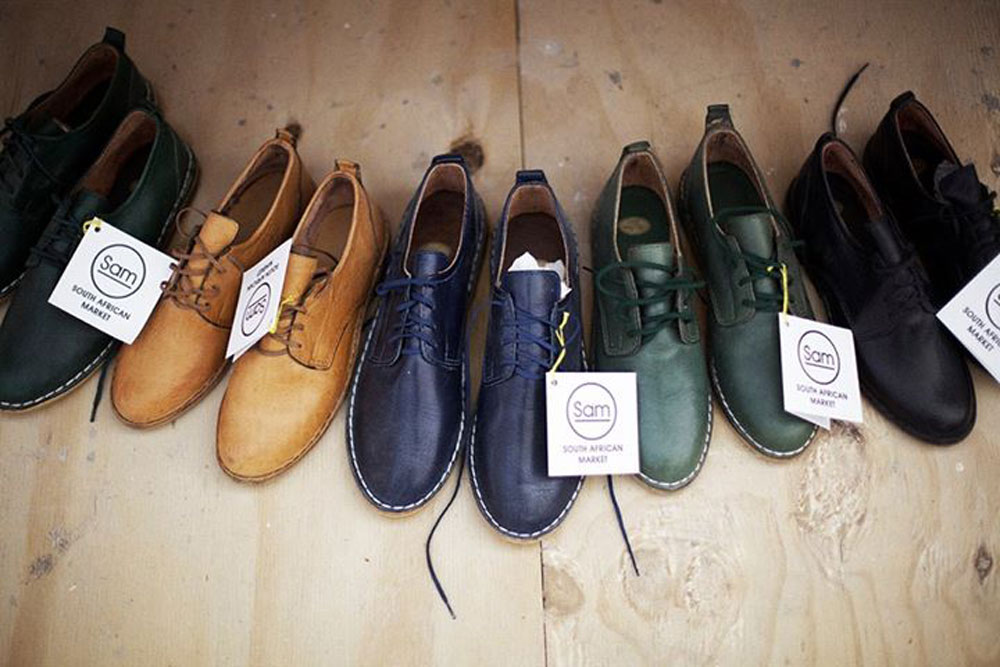On trendy Bree Street in Cape Town above the popular La Parada restaurant and tapas bar is the South African Market, a designer emporium known by the acronym SAM.
The loft like space is filled with ranges from a variety of local designers: fashion ranges from brands such as Celeste Arendse’s Selfi, Margot Molyneux and Shana; stationery, illustrations and accessories from Lauren Fowler, Soet and Essie Letterpress; furniture by Xandre Kriel, Jakob Basson, Piers Mansfield-Scaddan, Cameron Barnes; and homeware from Skermunkil, Handmade By Me, Love Milo, Ivy White and much more.
The shop stocks more than 100 local designers – almost double the number of brands in stock when the store first opened its doors here.
The store is an idea entrepreneur and designer Berlinda White had had for a long time – though it originally started as a website concept. Frustrated with having to visit different shops in her search for unique South African products, White sought to create a one-stop shop offering a variety of locally made design products.
Unprecedented popularity
After White met Dutch expatriate Naomi Bossert and discussed the idea with her, the two sought to make this vision a reality in late 2013.
“We sought to create an online platform for designers where we would do everything for them from admin to postage, because designers generally don’t like dealing with admin,” White explains, but they soon found the space on Bree Street and opened in December 2013.

Business partners Berlinda White and Naomi Bossert
On opening night, the emporium attracted about a thousand people who were curious about what promised to be an emporium of well-crafted and curated South African design products. “It wasn’t even First Thursday,” Bossert points out, speaking of the monthly art-focused event when participating establishments in this part of town stay open late to take advantage of the foot traffic that First Thursday attracts to the city once every month. “We didn’t expect to make too much on sales but the response was simply amazing.”
What they didn’t anticipate is just how popular the store and the works of designers would become. The duo was soon faced with challenges such as getting designers to keep up with consumer demand.
“Foreigners and locals alike love it. Having all of these talented designers in one consolidated space, where we offer everything from baby wear to accessories and clothing really worked. You can find everything here. Our customers are generally around 30 and older. They are young, working adults with a bit of disposable income. But even a 16-year-old can walk in and leave with something,” Bossert says.
Business mentors
Next month, the two founders of SAM plan to make their original website concept a reality. The online designer information resource will double up as an online store and plans are afoot to extend SAM’s reach up north with ambitions for a bricks-and-mortar store in Johannesburg.

This will put further pressure on the suppliers but over the past year the business partners say they’ve learnt much that will assist them to keep the shop and its online extension in a position to offer an optimal service to both designers and consumers.
Being designers themselves (White co-owns a clothing line called Gabrielle & Bernard and Bossert is behind the accessories label Soet) they know the challenges designers face. And although they’ve managed to help designers with things like administraion, they note that designers in general need a form of business mentoring to learn how to keep up with market demand, for example.
“Designers need help with the actual running of the businesses they have created. But I don’t think it’s about giving them a business course. Maybe a business mentor who will come in once in a while and help them with the books, paying themselves a salary and reserving funds for the running of the business,” White suggest.
SAM’s positive results, and other similar boutiques such as Egality in Parkhurst, Johannesburg, shine a spotlight on what is evidently a challenge faced by the local design industry.
Consumers are exposed to events such as Fashion Week, in the clothing sector specifically, but few know how to get their hands on the product. Market interest is certainly there.
The challenge is in making sure businesses are able to meet those demands while maintaining the kind of growth that will allow them to absorb more designers and make them available both on the shop floor and through virtual portals.
Visit ilovesam.co.za for more information